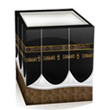Chapter 1: Sincerity and Significance of Intentions and all Actions, Apparent and Hidden
- Details
- Category: Ryahd Salehine
- Published on Friday, 27 September 2013 13:58
- Hits: 640
Sincerity and Significance of Intentions and all Actions, Apparent and Hidden
Allah, the Exalted, says:
"And they were commanded not, but that they should worship Allah, and worship none but Him Alone (abstaining from ascribing partners to Him), and perform As-Salat (Iqamat-as-Salat) and give Zakat, and that is the right religion.'' (98:5)
"It is neither their meat nor their blood that reaches Allah, but it is piety from you that reaches Him.'' (22:37)
"Say (O Muhammad (PBUH) ): Whether you hide what is in your breasts or reveal it, Allah knows it". (3:29)
1. Narrated 'Umar bin Al-Khattab (May Allah be pleased with him), reported: Messenger of Allah (PBUH) said, "The deeds are considered by the intentions, and a person will get the reward according to his intention. So whoever emigrated for Allah and His Messenger, his emigration will be for Allah and His Messenger; and whoever emigrated for worldly benefits or for a woman to marry, his emigration would be for what he emigrated for".
[Al-Bukhari and Muslim].
Commentary: According to some Ahadith, the reason for this Hadith is that a person sent a proposal of marriage to a woman named Umm Qais, which she turned down saying that he should have to emigrate to Al-Madinah for it. Accordingly, he did it for this specific purpose, and the two were married there. On account of this event, the man came to be known among the Companions as Muhajir Umm Qais.
On the basis of this Hadith, 'Ulama' are of the unanimous opinion that the real basis of one's actions is Niyyah (intention) and everyone will be requited according to his Niyyah. It is true that Niyyah is founded in one's heart, that is to say, one has first to make up one's mind for what he intends to do and he should not express it verbally. In fact, the latter is a Bid`ah (innovation in religion) because no proof of it is found in Shariah.
The point which becomes evident from this Hadith is that Ikhlas (sincerity) is a must for every action. In other words, in every righteous deed, one should seek only the Pleasure of Allah; otherwise, it will not be accepted by Allah.
2. Narrated 'A`ishah (May Allah be pleased with her) reported: Messenger of Allah (PBUH) said, "An army will raid the Ka`bah and when it reaches a desert land, all of them will be swallowed up by the earth.'' She asked; "O Messenger of Allah! Why all of them?'' He answered, "All of them will be swallowed by the earth but they will be raised for Judgement according to their intentions.''
[Al-Bukhari and Muslim].
Commentary: Everyone will be rewarded or punished according to his aim and intention. This Hadith also proves that the company of depraved persons is extremely dangerous. Whose army would it be, which has been referred to in the Hadith, and when will it invade Ka`bah, is a matter known to Allah Alone. Such prophecies are a part of the Unseen world. Since they come in the category of the miracles of the Prophet (PBUH), it is necessary to believe in their veracity and occurrence. Believing in such prophesies is also essential because they were revealed by Allah).
3. A`ishah (May Allah be pleased with her) narrated that the Prophet (PBUH) said, "There is no emigration after the conquest (of Makkah) but only Jihad [(striving and fighting in the cause of Allah) will continue] and good intention.* So if you are summoned to fight, go forth.''
[Al-Bukhari and Muslim].
*. Intention according to An-Nawawi: It means that goodness which ceased to continue by the cessation of emigration can still be obtained by Jihad and by intending accomplishing good deeds.
Commentary. When a country or a region is regarded as Dar-ul-Islam (land of Islam), it is not necessary to migrate from it to some other place. It is, however, obligatory to emigrate from such regions which are Dar-ul-Kufr (land of infidels) and where it is difficult to adhere to Islamic injunctions. It is also evident from this Hadith that when it is not necessary to migrate from one Islamic country to another then it is also not permitted by the Shari`ah to leave an Islamic country to settle permanently in Dar-ul-Kufr only for the reason that the latter has plenty of wealth and social welfare. Unfortunately, Muslims today are afflicted with this disease. The transfer of their capital and talent to Dar-ul-Kufr is indeed very disturbing because on one side these two factors are lending support to the economy of Bilad-ul-Kufr (countries of infidels) and on the other, obscenity and indecency that are common in such countries, are becoming increasingly common among the Muslims too.
Another highly important reason for the prohibition of migration of Muslims to Dar-ul-Kufr is that it goes against the spirit as well as their readiness for Jihad fi sabilillah (striving and fighting in the way of Allah). This spirit and readiness must be kept always alive so that the Muslims may respond at once to the call of Jihad whenever the need for it arises anywhere.
4. Jabir bin Abdullah Al-Ansari (May Allah be pleasedwith them) reported: We accompanied the Prophet (PBUH) in an expedition when he said, "There are some men in Al-Madinah who are with you wherever you march and whichever valley you cross. They have not joined you in person because of their illness.'' In another version he said: "They share the reward with you.''
[Muslim].
It is narrated by Bukhari from Anas bin Malik (May Allah be pleased with him): We were coming back from the battle of Tabuk with the Prophet (PBUH) when he remarked, "There are people whom we left behind in Al-Madinah who accompanied us in spirit in every pass and valley we crossed. They remained behind for a valid excuse.''
Commentary: What we learn from this Hadith is that if the intention and spirit of Jihad are present in the heart of a Muslim but physically he is unable to take part in it for valid reasons, he will get the reward of Jihad without even his actual participation in it.
5. Ma`n bin Yazid bin Akhnas (May Allah be pleased with them) (he, his father and his grandfather, all were Companions) reported: My father set aside some dinars for charity and gave them to a man in the mosque. I went to that man and took back those dinars. He said: "I had not intended you to be given.'' So we went to Messenger of Allah (PBUH), and put forth the matter before him. He said to my father, "Yazid, you have been rewarded for what you intended.'' And he said to me, "Ma`n, you are entitled to what you have taken.''
[Al-Bukhari].
Commentary:
1. This Hadith leads us to the conclusion that if Sadaqah (charity), goes to a needy son of a Muslim, there is no need to take it back from him for the reason that the father had intended to give it to a deserving person. The former gets the reward for it on account of his Niyyah (intention). This however, will be reckoned as Nafli Sadaqah (voluntary charity) because the obligatory Zakat (Sadaqah) cannot be given to the donor's own dependents.
2. It is permissible in Shari`ah to make someone a Wakil (attorney or agent) for Sadaqah.
3. It does not amount to disobedience on the part of a son to take his father to a competent authority or scholar to know the legal position on any issue, in the same way, as mutual discussion and debate on matters of Shari`ah does not amount to insolence. (Fath Al-Bari, chapter on Zakat).
6. Abu Ishaq Sa`d bin Abu Waqqas (May Allah be pleased with him) (one of the ten who had been given the glad tidings of entry into Jannah) narrated: Messenger of Allah (PBUH) visited me in my illness which became severe in the year of Hajjat-ul-Wada` (Farewell Pilgrimage). I said, "O Messenger of Allah, you can see the pain which I am suffering and I am a man of means and there is no





















